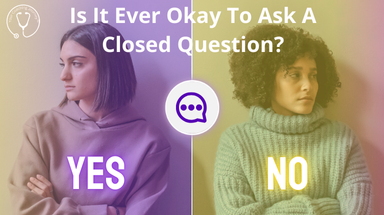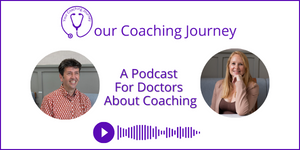Is it ever okay to ask a closed question?
The short answer is No.
But let’s discuss it further and find out more.
As this question demonstrates, if you ask a closed question, there is a good chance you’re just going to get a yes or no answer.
The definition of a closed question is that it is one that you could just answer yes or no to. You might not, but you could.
When we’re working with new coaches on our training courses, they’re typically learning coaching skills for the first time, and we really want them to focus on asking open questions.
People are so used to asking closed questions in everyday conversations. We never stop to think, oh, is that a closed question? The problem is, if we ask a closed question, there is a good chance that it will shut down the person’s thinking and also shut down the conversation. Within a coaching session, we want to give our coachee the best chance of giving an expansive answer and of expanding on their own thinking.
We are present as the coach to support them in expanding their thinking and finding their answers in the best way possible and when we ask open questions, we expand their thinking, we expand their awareness. If we start to ask close questions, then we shut that down.
Commonly used closed questions in coaching are something along the lines of:
- “Can you think of a time when this happened?”
- “Do you think that…?’
- “Is there anything else you can think of?”
- “Have you tried…?”
Does A Closed Question Always Impact The Flow of Coaching?
It’s perfectly possible that someone will say, yes, or no, and then expand on that and just carry on talking about their topic. But why take that risk?
On our Transformational Coaching Diploma training, we are pretty insistent that people ask open questions or at least try to ask open questions. We tend to work in trios so they will receive feedback from the people they’re working with. and when they’re receiving their feedback, those observing will be asked to pick up on closed questions and to let them know they’re doing it, because quite often they won’t even realise, because it’s so commonplace in everyday conversation.
It’s really important to embed that skill of asking good, crisp, open questions. We have six months to train people, so by the time they’ve finished, they can run a coaching conversation without asking closed questions. And that’s where we want to get to. If at some point in the future they choose to ask a closed question, they have that intention of asking a closed question, so be it. But we would like to know that by the end of their training, they could have a coaching conversation that doesn’t involve closed questions.
What Is The Best Way To Ensure Asking An Open Question?
Well, to use Rudyard Kipling’s six Honest Serving men, if we use six wise friends to start our questions,
- What?
- Where?
- How?
- Why?
- When?
- Who?
You’re going to ask an open question.
If you start your question with a verb, a doing word; like, can you, will you, could you, have you? It’s going to be a close question.
Of those six words, the most useful are how and what.
If we want to clarify when something happened or who they were with when something happened, we will just naturally ask ‘who?’, ‘when?’, ‘where?’ And we’re not in danger of asking a closed question.
But if we want to know more, if we ask ‘how?’ and ‘what?’, and start each question with one of those words, then all will be well.
Why not ‘Why?’
Our intention in the coaching space is for our coachee to feel relaxed and not as though they are being judged. There is a danger that if we ask a ‘why’ question, it takes them back to conversations with their parents, with teachers, with bosses who ask, “Why did you do that?” In a very judgemental way.
Most of us have that relationship with ‘why’ questions when it’s about us: If it’s about something we’ve done or something we’re about to do, being asked why will perhaps make us a little bit defensive. And that’s not good for expanding our thinking or helpful in thinking creatively. It might also cause us to break rapport with clients, because suddenly they see you as that critical parent or someone telling them off, almost as if you’re in a teacher role. And of course, that’s not the role that we have as coaches.
Instead, we might choose to ask, ‘For what purpose are you thinking of doing that? That is a different way of asking a why question. It can seem a strange question to ask, and it stops people and makes them think, and then they will come up with an answer without feeling defensive.
If, however, you are asking coachee a question about a circumstance, situation, an inanimate object, or a third party, you might use the ‘why’ question: For example,
- Why do you think that happened?
- Why do you think they did that?
- Why do you think that’s an issue?
People are unlikely to get defensive about that. But if we ask it about them personally, then there is a chance that they can be.
The topic of the ‘why’ question is often debated in the coaching world, and there’s no evidence for using it or not using it, but much like closed questions. Why risk it?
Other Questions To Avoid
Multiple questions is something that we often see, even from quite experienced coaches. Rather than asking just one crisp, open question, they’ll ask a question, then they’ll do a little bit of playing back and then they’ll ask another question.
“what do you think about this? Because you said earlier that this was a thing. And now there is this other thing, so what are you thinking now?
Rather than sandwiching that statement with a couple of questions, either end just ask one crisp open question and let the other person answer it.
This is something you quite often hear with radio interviews. If you listen to the today programme quite often the interviewer, will ask a number of questions, and the interviewee at the end is kind of left thinking, well, which question do I answer? Because you’ve asked a number of different ones there.
Quite often people ask a second question because they don’t have the confidence that the coachee has understood the question. Instead of giving them time to think, they try to rephrase it before the person has a chance to answer it. But most people will understand what you’re asking, and if they don’t, they might stop and tell you. Or they’ll talk about something else. Giving the coachee space to think about the question and not immediately assuming that silence means they haven’t understood the question is good coaching practise,
The silence is the space in which they do their really good thinking, so we want to allow for that to happen.
Leading questions are the other type we don’t want to hear. This is where the coach has perhaps had a thought that they want to share, but they want to ask good open questions and don’t want to be directive. But somehow their advice still comes out in their question and they start to lead the coachee in the direction that they wanted to go.
Let’s imagine that someone wanted to lose weight and a coach had a thought, ‘oh, I know what the answer is here’. And they want to share that, but they don’t want to be directive. They might say, “have you thought of trying Weight Watchers?”
Now that’s a close question obviously, but it’s also a leading question.
They might ask that question in a more open way:
“What do you think would happen if you tried calorie counting?”
So again, they’re getting their bit of advice in there in the question.
We want to avoid that because we want the coachee to think for themselves.
In Summary:
Ask crisp, clear, open, single questions and ensure the coachee has lots of space, lots of time to think and generate new thinking and new perspectives. That’s what we want from a coaching session.
Even if you’re an experience coach is to really think about the questions that you ask going forward and if you have a closed one in mind, really consider what is the open question that lies behind that closed question?
To find out more about our Doctors’ Transformational Coaching Diploma click through here



